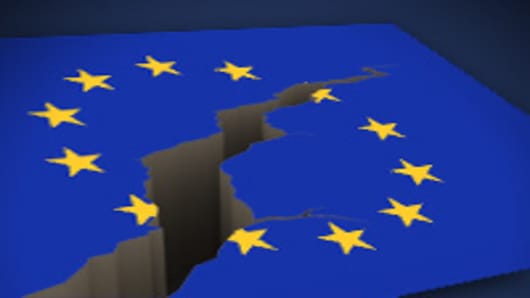As the prospect of a conclusive road map for the euro zone emerging from Wednesday's European Union summit receded, proposals to expand the European Financial Stability Facility (EFSF) via a special purpose investment vehicle (SPIV) were met with cynicism.
"It sounds like the world's largest giant sub-prime CDO," Julian Pendock, Partner, Senhouse Capital, told CNBC Wednesday.
"This will be quite a difficult sell to the markets. Remember that sovereign wealth funds around the world got their fingers burned trying to support banks during the crisis."
The SPIV proposal involves setting up a fund that would issue debt and hopefully attract money from sovereign wealth funds and other investors, including potentially the International Monetary Fund. The debt component is what is worrying the markets.
The other option for the EFSF, favored by Germany, the region's biggest economy, involves providing insurance against possible losses to attract sovereign bond buyers. Leaders could opt for a combination for the two.
Wrangling over the best way to solve the euro zone debt crisis has caused volatility in the markets for months. The future of the single currency itself could be threatened if European Union leaders cannot find a workable agreement, an increasing number of analysts believe.
Key Issues
There are three key issues which market observers want to see addressed in the announcements following the summits Wednesday afternoon and evening in Europe. Bank recapitalization, on which there seems to be broad agreement, how to scale up the 440 billion euro ($613 billion) EFSF, and the size of the hit taken by the private sector on Greek bonds.
"We really need to see the details that can convince us of the commitment that they are putting into this deal," Jens Larsen, Chief European Economist at RBC, told CNBC.
"There's a very significant risk that the response to this package would be further tightening of credit conditions, not just in the peripheral, but in the core of the euro zone – and that's exactly what we don't need."
He added that the continued involvement of the European Central Bank (ECB) was also very important.
Wednesday afternoon's meeting of the heads of European Union member states will be followed by a meeting of the euro zone leaders.
"People are starting to understand there will be no quick fix," said Pendock. "They certainly can't look for the euro zone to lead anyone out of the mire."
Markets have risen around the world this week, including the FTSEurofirst 300.
Pendock believes that the recent rises are due more to low trading volumes than to increased optimism. He added that there was also a chance that investors are desperate for any sign of good news after a tough year.
"Most people have had a bad year, and quite a few were caught long and wrong after Q3," he said.
"I don’t think people will be looking too long at underlying fundamentals, they just want an excuse for the market to go up."



